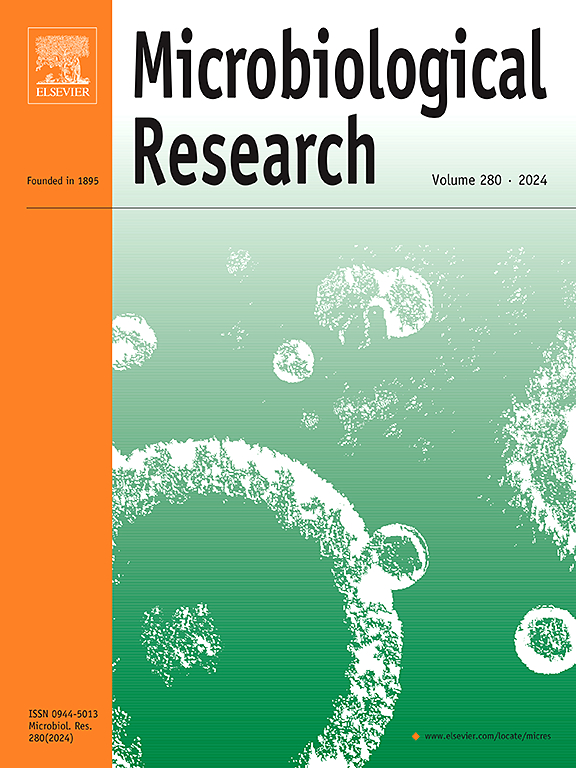Clostridium butyricum-induced balance in colonic retinol metabolism and short-chain fatty acid levels inhibit IgA-related mucosal immunity and relieve colitis developments
IF 6.1
1区 生物学
Q1 MICROBIOLOGY
引用次数: 0
Abstract
Gut microbiota and their metabolites play a significant role in inflammatory bowel disease. Here, we attempted to determine the anti-inflammatory role of the probiotic Clostridium. butyricum (CB) in inflammatory bowel disease and identify the exact immune mechanism. The clinical significance of Clostridiales and CB was explored in patients with ulcerative colitis. The inflammation-suppressive role of CB was evaluated in mice with DSS-induced colitis. 16S rRNA sequencing was performed to assess changes in the gut microbiota. Altered transcription levels were detected by RNA sequencing. Flow cytometry was performed to assess the frequency of IgA responses to gut microbiota. Clostridiales and CB were depleted in ulcerative colitis. Oral gavage with CB significantly suppressed weight loss and colon shortening in the dextran sulfate sodium-induced colitis mouse model. Intestinal barrier injury was reversed and the gut microbiota was restored upon treatment with CB administration. The mucosal immune response to gut microbiota was reversed upon treatment with CB. CB conditional medium was more effective than heat-killed CB in alleviating inflammation. Mechanistically, retinol metabolism and retinoic acid levels were higher in groups treated with CB and butyrate. CB and the metabolite butyrate exerted a suppressive role on the abundance of Immunoglobulin A-coated gut microbiota by inhibiting retinoic acid synthesis. In summary, CB protects against inflammation and intestinal barrier injury by producing anti-inflammatory metabolites that can regulate the mucosal immune response to gut microbiota by increasing retinoic acid levels in the colon.
丁酸梭菌诱导的结肠视黄醇代谢和短链脂肪酸水平平衡抑制iga相关的粘膜免疫,缓解结肠炎的发展
肠道菌群及其代谢产物在炎症性肠病中起重要作用。在这里,我们试图确定益生菌梭菌的抗炎作用。丁酸盐(CB)在炎症性肠病中的作用及确定确切的免疫机制。探讨溃疡性结肠炎患者梭状芽孢杆菌和大肠杆菌的临床意义。在dss诱导的结肠炎小鼠中评估了CB的炎症抑制作用。采用16S rRNA测序来评估肠道菌群的变化。通过RNA测序检测转录水平的改变。采用流式细胞术评估IgA对肠道菌群的反应频率。溃疡性结肠炎患者梭状芽孢杆菌和梭状芽孢杆菌减少。大肠杆菌灌胃可显著抑制硫酸葡聚糖钠诱导结肠炎小鼠模型的体重减轻和结肠缩短。肠屏障损伤得到逆转,肠道菌群得到恢复。小肠黏膜对肠道菌群的免疫反应在用炭疽杆菌治疗后发生逆转。CB条件培养基对炎症的缓解效果优于热灭活CB。机制上,丁酸和丁酸处理组视黄醇代谢和视黄酸水平较高。CB及其代谢物丁酸盐通过抑制维甲酸合成来抑制免疫球蛋白a包被肠道菌群的丰度。综上所述,CB通过产生抗炎代谢物来预防炎症和肠道屏障损伤,这些代谢物可以通过增加结肠中维甲酸的水平来调节对肠道微生物群的黏膜免疫反应。
本文章由计算机程序翻译,如有差异,请以英文原文为准。
求助全文
约1分钟内获得全文
求助全文
来源期刊

Microbiological research
生物-微生物学
CiteScore
10.90
自引率
6.00%
发文量
249
审稿时长
29 days
期刊介绍:
Microbiological Research is devoted to publishing reports on prokaryotic and eukaryotic microorganisms such as yeasts, fungi, bacteria, archaea, and protozoa. Research on interactions between pathogenic microorganisms and their environment or hosts are also covered.
 求助内容:
求助内容: 应助结果提醒方式:
应助结果提醒方式:


